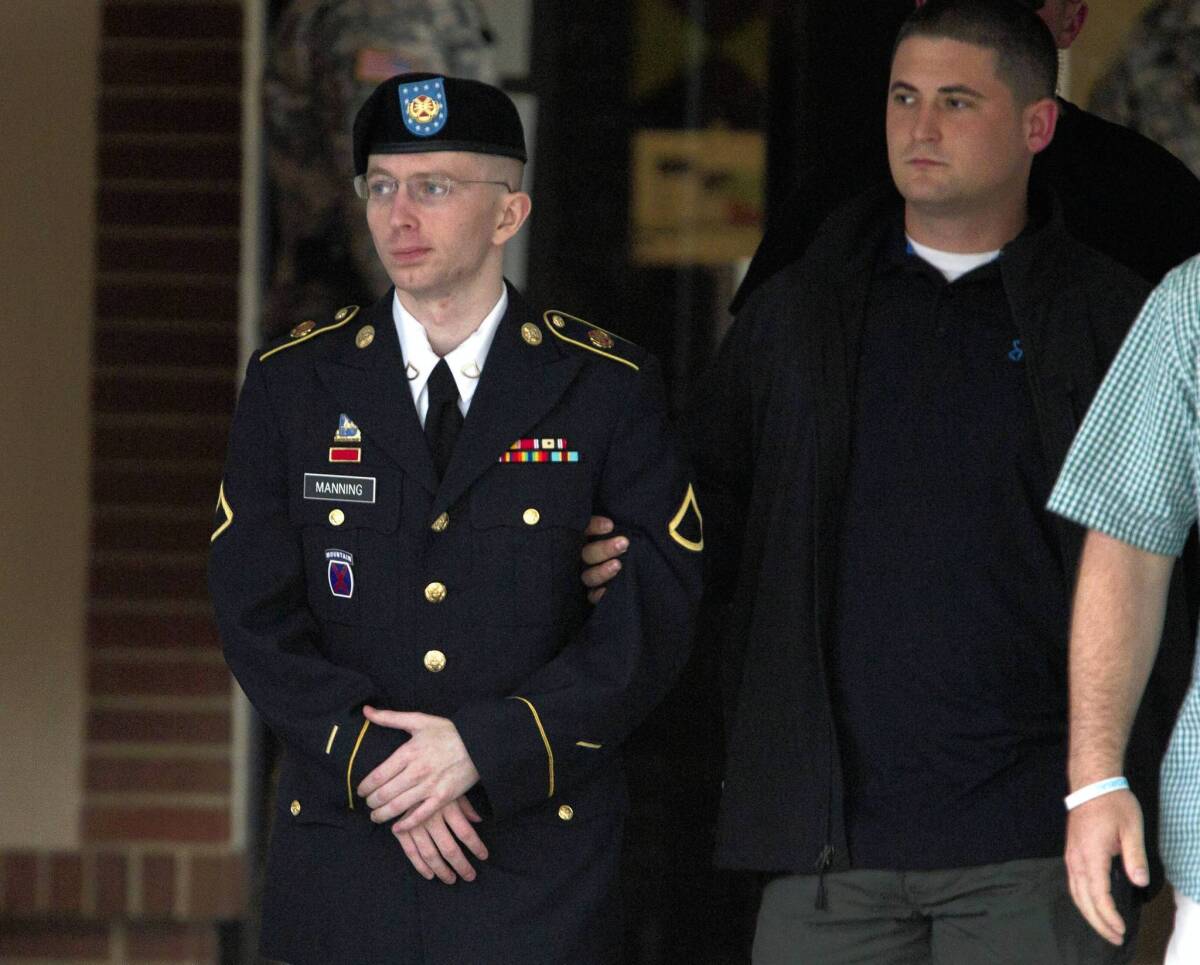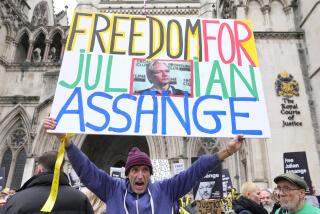Defense opens in Bradley Manning’s court-martial

- Share via
FT. MEADE, Md. — Army Pfc. Bradley Manning never meant to harm national security, but he believed Americans deserved to know how the Pentagon was waging war in Iraq and Afghanistan, his lawyers told a military judge Monday.
As the defense opened in the former intelligence analyst’s court-martial, Manning’s lawyers also filed four motions asking for a directed verdict of not guilty, contending that the government had not proved that he had committed espionage or other offenses.
The judge, Army Col. Denise Lind, said she would review the briefs after the prosecution responded by Thursday.
Manning, now 25, gave the anti-secrecy organization WikiLeaks more than 700,000 U.S. intelligence files, videos and diplomatic cables. The prosecution, which offered accounts from about 80 witnesses over five weeks, hopes the judge will sentence him to life in prison for the biggest leak of classified information in U.S. history.
The defense opened with a now-infamous video leaked by Manning: An Apache combat helicopter attack in Iraq in which U.S. soldiers fire on unarmed civilians, killing children and two Reuters journalists, among others.
The first defense witness, Army Chief Warrant Officer Joshua Ehresman, was an intelligence analyst who supervised Manning near Baghdad. He said their unit was often chaotic, with computers crashing “every two or three minutes,” music playing and DVDs brought in from the post exchange or purchased from “salesmen outside.”
Despite that environment, Ehresman said, Manning “was our best analyst by far. For most soldiers, you would have to spell it out. With Manning, he would come up with exactly what you were looking for. He was our go-to guy.” He added that Manning’s intelligence reports were “very detailed” and that he had the highest production level in the unit.
Army Sgt. David Sadtler said Manning showed him material that described civilians being arrested for protesting in Iraq. “He was upset over the situation,” Sadtler said.
A friend of Manning, Lauren McNamara, brought a thick printout of chat logs from their Internet conversations between February and August 2009, just before he began leaking material. Defense lawyers wanted to use the chat logs to highlight Manning’s state of mind when he changed from analyst to leaker.
McNamara said Manning contacted her at her AOL instant messenger address after watching her YouTube videos discussing atheism and civil rights.
“We often talked about politics, global affairs, Pvt. Manning’s life before then and what his job involved,” she said. “We were just a couple of people talking about our lives, and he shared various experiences and interests. He often had interesting things to say about his job and world affairs. It seemed like he just wanted someone to talk to about these things.”
“He suggested that he wanted to go into politics,” she said. “He wanted to learn more about philosophy and various other topics,” and told her that the more he read and learned, the more he could “hopefully save lives.” He told her “he was concerned with saving the lives of families in foreign countries and other noncombatants and the families of soldiers and soldiers themselves, and making sure they got home safely,” McNamara said.
“He considered human life to be valuable above all,” she added, telling her that he “put people first.” He told her about “creepy conservatives,” but said the military was “overall, a positive force.” But he also derided the military as a “male-dominated, Christian right organization.”
Under cross-examination, McNamara said Manning told her that “activism is fun” and that the military is messed up.
Defense lawyers plan to call two dozen to four dozen witnesses. They must convince the judge that Manning, whose father was a Navy intelligence analyst during the Vietnam War, was just an idealistic youth from a small town in Oklahoma.
Several dozen Manning sympathizers rallied outside the main gate to Ft. Meade. In the small courtroom near the headquarters of the National Security Agency and the Defense Information Systems Agency, a dozen more Manning supporters wore black T-shirts with the word “truth” in white.
In February, Manning pleaded guilty to 10 lesser charges of unauthorized possession, willful communication and improper storage of classified material. For that, he faces a 20-year sentence. He has pleaded not guilty to violating the Espionage and Computer Fraud and Abuse acts, which could bring a life sentence if he is convicted.
He has also pleaded not guilty to larceny, aiding the enemy and improper use of government information systems.
More to Read
Sign up for Essential California
The most important California stories and recommendations in your inbox every morning.
You may occasionally receive promotional content from the Los Angeles Times.











